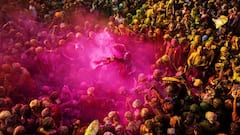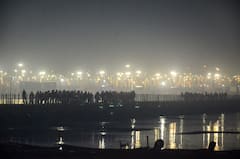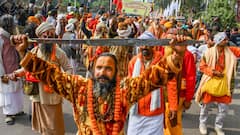Prayagraj: Covid Fear Evident As Devotees Visit Triveni Sangam In Small Numbers For Pitru Paksha
Pind daan holds special importance in Prayagraj as it is believed to be the first and main gate of pitra mukti. However, due to the Covid-19 pandemic, only a small number of devotees visited Prayagraj

New Delhi: The fortnight-long Pitru Paksha for the peace and liberation of the souls of the forefathers has begun today. On the very first day of Pitru Paksha, hundreds of devotees are performing pind daan and tarpan at the Sangam of Tirthraj Prayag (Prayagraj) and taking a dip in the stream of Triveni Sangam, and praying for the peace of the souls of their ancestors.
Pind Daan holds special importance in Prayag because it is called the first and main gate of pitra mukti. However, due to the corona pandemic this time, there is a significant impact on the number of devotees. The banks of the confluence are not buzzing with devotees like last year.
According to Hinduism, the tradition of pind daan is only in Prayag, Kashi, and Gaya. The shradh ceremony of the ancestors begins with the head-shaving ceremony (Mundan sanskar) in Prayag. On the first day of Pitru Paksha, thousands of devotees from all corners of the country perform a shradh ceremony for the peace and liberation of the souls of their ancestors on the banks of Sangam in Prayag today.
After shaving and donating hair, seventeen bodies are prepared and worshipped, and the rest of the rituals are being performed by immersing them in the Sangam in Prayag as per tradition.
In Hinduism, the Pitru Paksha is considered taboo for auspicious works. It is believed that performing the shradh ceremony in the Pitru Paksha, performing pind daan and tarpan gives peace and liberation to the souls of sixteen generations of ancestors. The shradh performed on this occasion also relieves one, of the ancestor's debt.
According to beliefs, a person can do pind daan only once in a lifetime. However, the rituals of tarpan, charity, etc. can be performed many times.
Lord Vishnu Considered As God of Salvation
In Hindu scriptures, Lord Vishnu is considered to be the god of salvation. Lord Vishnu is seated in Tirthraj Prayag in twelve different Madhava incarnations. It is believed that Bal Mukund resides in the form of Lord Vishnu in the holy Triveni Sangam of rivers Ganga, Yamuna, and the invisible Saraswati. That is why Prayag is considered to be the first and most important gate of pitra mukti. Kashi is called middle and Gaya is called the last gate.
The shradh ceremony of ancestors begins with the head-shaving ceremony (mundan sanskar) in Prayag itself. There is a tradition of devotees donating their hair. Then seventeen bodies made of sesame, barley, and flour are prepared and worshipped as per rituals. They are then immersing in the Ganges.
The devotees then bathe in the Sangam and offer water to them. It is believed that by performing pind daan at the Sangam, 33 crore deities residing in Lord Vishnu and in Tirthraj Prayag give salvation to the ancestors.
Shradh Rituals Online Due To Covid-19 Pandemic
It is because of religious importance that on the very first day of pitru paksha, thousands of devotees from all corners of the country are offer pind daan and tarpan at the Sangam at Tirthraj Prayag.
However, this time due to the corona pandemic, only a small number of devotees are reaching Prayagraj. Experts say that people are still scared of the corona, so they are performing pind daan and shradh rituals online. However, despite the difficulties, there is no dearth of faith among the devotees.
According to Hinduism, no one dies completely and is born again and again, so the tradition of pleasing the forefathers by performing pind daan and tarpan in Pitru Paksha has been going on for centuries.
Related Video
Bihar News: Shocking Revelation in Patna NEET Student Death Case, CT Scan Confirms Head Injury






































